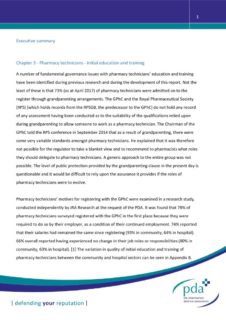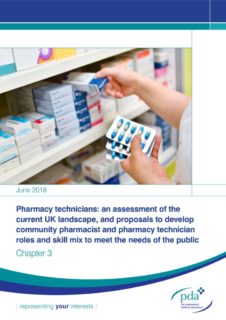The grandparenting entry arrangements were established by the RPSGB in its previous life as the pharmacy regulator and ended in 2010, prior to the establishment of the GPhC.
In September 2014, at the RPS conference, the current Chair of the GPhC Nigel Clarke was asked whether the GPhC would be prepared to issue guidance to pharmacists, to encourage them to delegate tasks to pharmacy technicians. He explained that as a result of grandparenting, there were some very variable standards amongst pharmacy technicians. He told the conference that it was therefore not possible for the regulator to take a blanket view and to recommend to pharmacists what roles they should delegate to pharmacy technicians; a generic approach to the entire group was not possible.
“Under such circumstances it is unsurprising that community pharmacists are reluctant to delegate and that the government’s proposals to change the rules on supervision are mired in concerns over patient safety and a lack of support from community pharmacists”, said Mark Koziol, Chairman of the PDA.
Mark continued: “A pharmacy without a pharmacist is never going to be as safe as a pharmacy with a pharmacist present, however, if pharmacists are to contemplate engaging in new and more patient facing roles, they must be able to have much greater confidence in the ability of pharmacy technicians to be able to undertake the tasks that they are delegated. Pharmacy technicians in community pharmacy must be able to provide a safe and robust workforce upon which pharmacists and ultimately patients can rely.”
The report’s recommendations
Following a substantial project on skill mix in pharmacy, the PDA recommends that;
- The current variance in the training and educational standards of existing pharmacy technicians presents risks to the proper development of skill mix in community pharmacy and must be addressed.
- The public register of pharmacy technicians should be annotated for those individuals who have been grand-parented on to it and for those in possession of the recently acquired NVQ3 qualifications.
Going forward, the standards for the education of pharmacy technicians should be reviewed if skill mix is to flourish. The PDA recommends that;
- A minimum entry level requirement should be established of at least 5 GCSEs at grade C or above, including Maths, English and either Chemistry or Biology, for enrolment on to pharmacy technician initial education and training courses.
- The current NVQ level 3 qualification standard for pharmacy technicians should be increased to a level 4/5 educational (HNC/HND/foundation degree) standard.
- A registration assessment for all pharmacy technicians should be established as a condition of formal registration. This would provide quality assurance and guarantee a minimum level of knowledge. This process should be administered by the GPhC.
Download a summary of the third chapter here
DOWNLOAD THE FULL third CHAPTER HERE
NOTE TO EDITORS
About the PDA
About the PDA
The PDA (Pharmacists’ Defence Association) has more than 32,000 members and is the largest pharmacists’ membership organisation and the only independent trade union exclusively for pharmacists in the UK. The PDA represents the interests and defends the reputation of pharmacists throughout their career. PDA is a member of the General Federation of Trade Unions (GFTU), Irish Congress of Trade Unions (ICTU), Employed Pharmacists of the European Union (EPhEU) and the Scottish Trade Union Congress (STUC).Press enquiries
For press enquiries, please contact:
Shemaine Rose
PR & Communications Manager
T: +44 (0)121 513 0950
E: press@the-pda.org
W: www.the-pda.org

